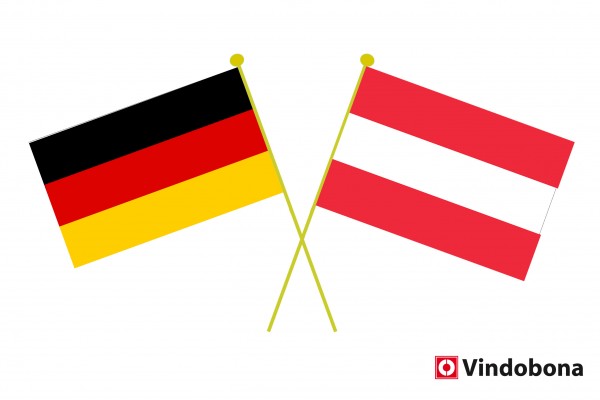How the War in Ukraine Affects German-Austrian Trade Relations
After a Corona-induced decline in trade between Germany and Austria, the situation seemed to settle down again in 2021. However, high expectations for growth have recently been depressed by the Russian invasion of Ukraine. A brief analysis.
 The economic uncertainty caused by the war in Ukraine is putting a strain on the trade relationship between the two countries. / Picture: © German and Austrian crossed flags by Vindobona
The economic uncertainty caused by the war in Ukraine is putting a strain on the trade relationship between the two countries. / Picture: © German and Austrian crossed flags by Vindobona
Germany and Austria have always been important trading partners. After a decline in bilateral trade between the two countries in 2020, it recovered again in 2021: "While the German-Austrian trade volume still declined by around 9 percent in 2020, the old strength was regained in 2021. The joint trade volume increased by almost 19 percent and reached a new all-time high," said Hans Dieter Pötsch, President of the German Chamber of Commerce in Austria (DHK).
According to figures released by the German Federal Statistical Office, Austrian exports increased by 17.9 percent to 47.7 billion euros. German exports to Austria increased by 19.7 percent to 71.7 billion euros. With a total trade volume of 119.4 billion euros, a record value was even achieved. With this development, Austria has once again become Germany's seventh most important foreign trade partner.
After initially rosy forecasts for 2022, both countries had to scale back their expectations. The Ukraine war will put an enormous strain on the European economy and these effects are also reflected in the German-Austrian growth dynamic.
"We are seeing a great deal of uncertainty among our companies as to how they should deal with the increased raw material and energy prices. The current energy prices are also jeopardizing the competitiveness of Germany and Austria as industrial locations in the long term," notes Thomas Gindele, CEO of the German Chamber of Commerce in Austria.
Due to the current high energy prices, households are currently losing enormous purchasing power, which has negative consequences for consumption. This is causing the German but also the Austrian export engine to stutter.
"The value creation networks between Germany and Austria are as intertwined as those of few other economic areas. It is therefore crucial to find coordinated answers to the major challenges of our time - to the emerging deglobalization and the necessary decarbonization of energy systems," said Gabriel Felbermayr, Director of the Austrian Institute of Economic Research (WIFO).
Appeal to politicians
DHK President Hans Dieter Pötsch and WIFO Director Felbermayr appeal to politicians: "The current crisis entails consequences and tasks that must be implemented quickly. This applies to the development and expansion of a new energy infrastructure, but also to the accelerated further development of the digital infrastructure. For this, we need a reliable planning framework in Germany and Austria that is also open to technology. Above all, however, we need faster planning and approval procedures."
The international framework would also have to be set more quickly and decisively. Germany, Austria and Europe would have to do more to promote free and fair trade. Trade and investment agreements are not only a contribution to growth and prosperity, but also support joint efforts for climate protection, social standards and human rights.



